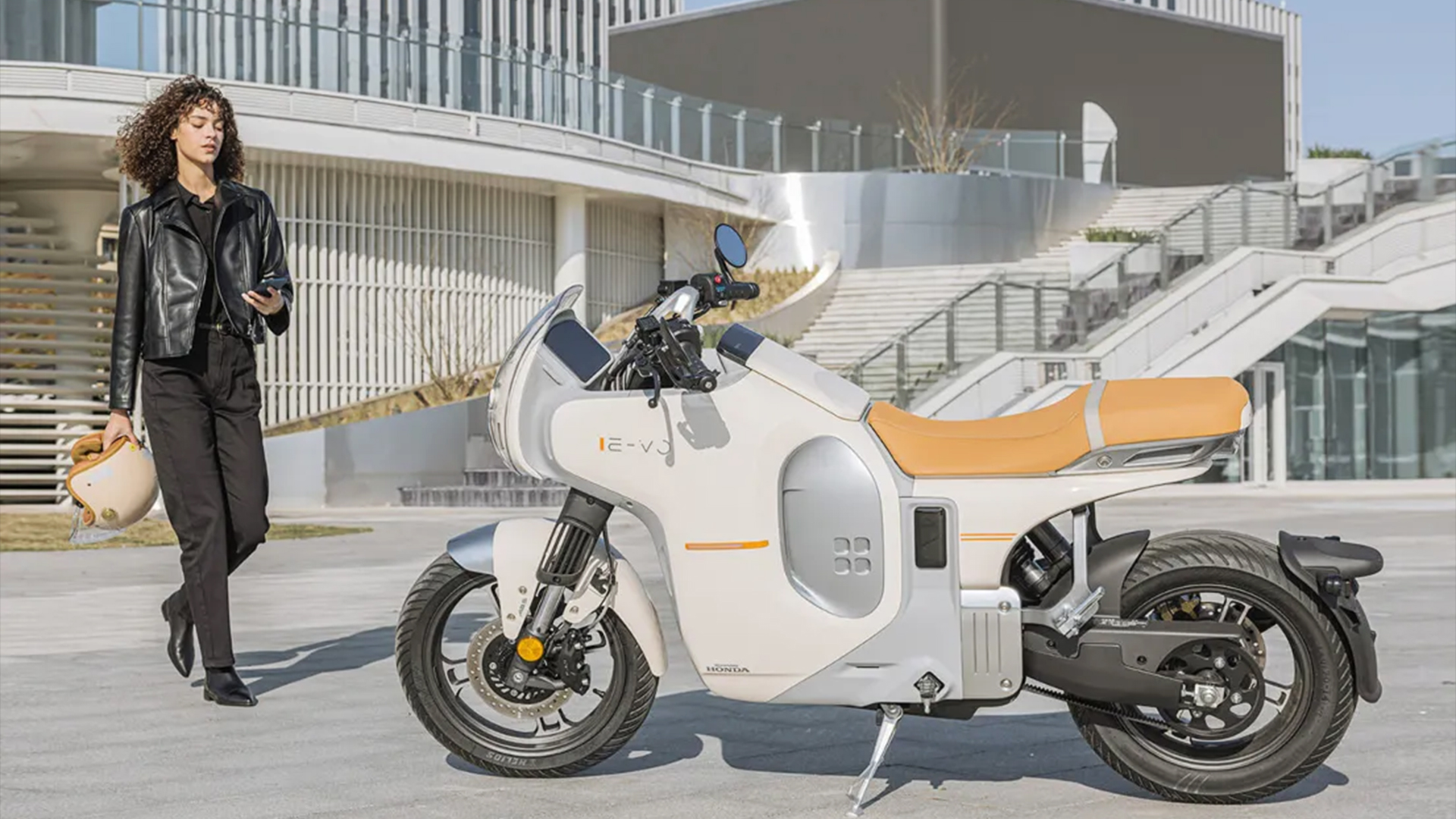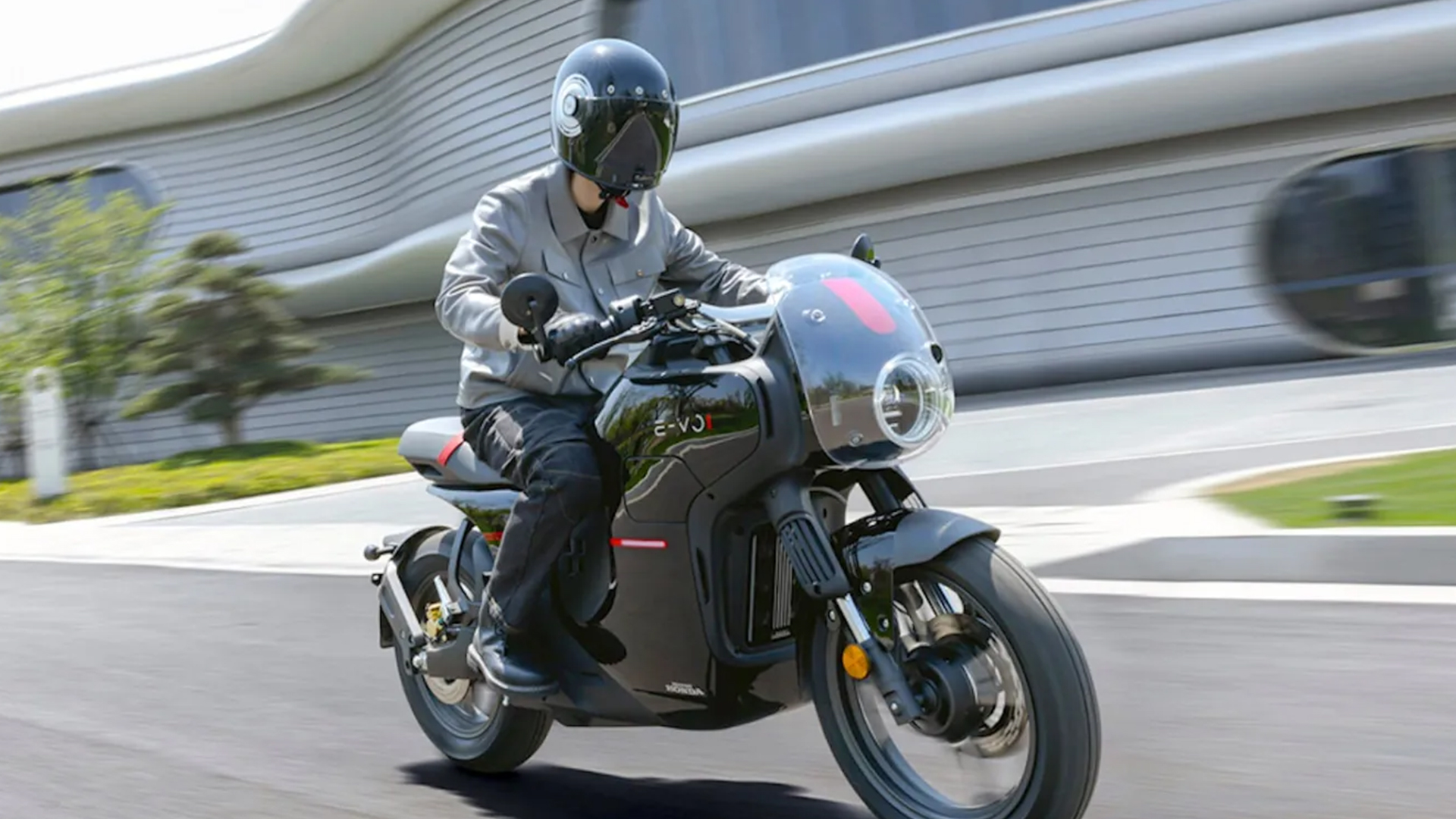Honda launches its first-ever production electric motorbike, but I'll be skipping it for these 3 reasons
Being 'made-for-China' is just one of the issues

Despite Honda teasing a number of all-electric motorcycle concepts at several shows, including last year’s EICMA event in Italy, it has yet to fully commit to electrification and put something meaty into production.
That is all about to change, as its collaboration with Chinese bike-maker Wuyang has resulted in the Wuyang-Honda WH8000D, or the first production electric motorcycle from the famous Japanese two-wheel specialist.
Granted, Honda-badged electric scooters have come before this, but the WH8000D, which will likely be called the E-VO in its domestic Chinese market, is the first to resemble a 'proper' motorcycle.
Taking inspiration from the gorgeous RC-E concept bike that appeared at the 2011 Tokyo motor show, the E-VO boasts retro-futuristic cafe racer styling, with a neat round headlight, sporty fairing, rear-set footpegs and slightly dropped handlebars.
It’s a little awkward to look at and not quite as handsome as the 1960s GP bike-influences of the aforementioned concept, but it is arguably more impressive than the step-through electric scooters that have so far rolled out of Honda production facilities.
Despite adopting the air of a larger capacity machine, the E-VO is designed to compete with 125cc combustion engine motorcycles, as the motor it uses boasts a peak power of 15.3 kW – or around 20bhp, according to Electrek.

This means that the top speed will be limited to around 68mph to 75mph in the lightest models, although Wuyang-Honda suggests it can accelerate from rest to around 30 mph (city traffic speeds) in just 2.8 seconds .
Get daily insight, inspiration and deals in your inbox
Sign up for breaking news, reviews, opinion, top tech deals, and more.
The second sticky issue is the battery capacities and charging speeds, as it will be offered in China in either 4.1 or 6.2 kWh guises. The former offers around 74 miles of range but weighs a portly 143kg.
There is also a heavier triple battery pack option that sees the range climb to 105 miles, but charging takes around 2.5 hours on a standard domestic outlet or about 90 minutes on a low-power Level 2 EV charger. There’s no option to fast charge the motorcycle.
However, battery swap technology is becoming increasingly popular in China (and further afield), with Cycle World suggesting that the E-VO could well take advantage of something like Honda’s existing Mobile Power Pack e swappable tech.
This would allow users to either remove the batteries and charge them away from the bike, but also swap them for fully charged units at dedicated stations.
But if that sort of convenience doesn't exist, the Wuyang-Honda becomes a vehicle that is really only good for short commutes – something that can easily be tackled by a more affordable and more convenient ICE scooter.
Bang for the yuan

Despite looking slightly odd, not packing particularly punchy performance, offering relatively meager range and slow charging speeds, the Honda-Wuyang E-VO comes fitted with some impressive technology for the money.
According to Electrek, prices start at 29,999 yuan, or about $4,500 / £3,100 / AU$6,465 for the 4.1 kWh version, and 36,999 yuan (about $5,100 / £3,811 / AU$7,970) for the 6.2 kWh triple-pack version.
However, the bikes come complete with two 7-inch TFT displays that take care of instrumentation, as well as some infotainment duties. There are also built-in front and rear dash cams for added safety.
Throw in the 'big bike' inverted front forks, disc brakes and adjustable levers and it starts to look like an impressive package for the money, but it will likely be a lot more expensive should it be primed for global sales.
This is where smaller-capacity EVs like this don’t really make much financial sense, as their combustion engine counterparts are more convenient, offer similar performance and generally cost less. Take the Maeving RM-1, Super Soco’s TC Max and Kawasaki’s Ninja Z e-1 as good examples of this.
But a wider range of electric motorcycles are on the horizon, with Royal Enfield hoping to be among the first major manufacturers to offer low-cost electrified two-wheel transport when its Flying Flea model eventually goes on sale in early 2026.
You might also like
- I rode the new Maeving RM1S – and it's the first truly convincing 125cc electric motorbike I've tried
- Royal Enfield has turned this classic WW2 bike into a next-gen EV range – and it might just take electric motorcycles mainstream
- Honda unveils a series of sleek EVs for China and they're way more exciting than anything we get in the rest of the world

Leon has been navigating a world where automotive and tech collide for almost 20 years, reporting on everything from in-car entertainment to robotised manufacturing plants. Currently, EVs are the focus of his attentions, but give it a few years and it will be electric vertical take-off and landing craft. Outside of work hours, he can be found tinkering with distinctly analogue motorcycles, because electric motors are no replacement for an old Honda inline four.
You must confirm your public display name before commenting
Please logout and then login again, you will then be prompted to enter your display name.